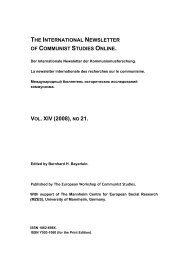11RXNdQ
11RXNdQ
11RXNdQ
You also want an ePaper? Increase the reach of your titles
YUMPU automatically turns print PDFs into web optimized ePapers that Google loves.
Colonialism and Neocolonialism 104<br />
administer, and the blacks were in power but not yet in command. At this contradictory<br />
moment, Lumumba, however popular he might be, did not draw his authority from past<br />
actions but from authority imported from Europe, and which the Congolese – apart from<br />
the évolués – did not recognize. Of course his courage was admirable (he was known to<br />
have been arrested several times, beaten and thrown into prison), but that was not<br />
enough. In order to hold supreme power in a new state, one must have held it during the<br />
times of oppression as the unquestioned leader of the liberation army, or have possessed<br />
charismatic or religious power for a long time. Unfortunately, it was Kasavubu who<br />
possessed this power in Léopoldville. It must be understood that on 1 July 1960,<br />
Lumumba – leader of a majority coalition and head of the government – was isolated,<br />
without power, betrayed by everyone and already lost.<br />
As I have said, when peoples free themselves by force, they throw out or massacre the<br />
former cadres who are simply their most visible oppressors. They have to be quickly<br />
replaced; as everyone is equally incompetent, the choice is guided according to<br />
revolutionary zeal rather than ability. The result is terrible confusion, criminal errors, and<br />
entire sectors of the economy are placed in grave jeopardy. But a victorious revolution<br />
has yet to collapse because there was no elite. Though painful convulsions were the price<br />
they had to pay, newcomers in the USSR, China, Vietnam and Cuba took up controlling<br />
positions, governing, inspecting and making decisions during the day, learning and<br />
reading at night. Thus the replacement of reactionary experts by inexpert revolutionaries<br />
is a normal and positive fact in the development of a revolution. And if this substitution is<br />
not carried out by force, it becomes necessary owing to the massive emigration of the<br />
specialists.<br />
Moreover, this leap into the unknown has to be made spontaneously, and emerge as an<br />
inevitable moment of praxis. Who would dare systematically to replace knowledge with<br />
ignorance at all levels of the social hierarchy, if not in the storm of revolution? Lumumba<br />
was a revolutionary without a revolution. His inflexible Jacobinism brought him into<br />
radical conflict with the hypocritical improvements to colonialism which the Belgian<br />
government was attempting without dexterity to make, but this rigorous position was<br />
only a theoretical rejection, precisely because the popular war had not taken place. By<br />
dispensing with it, the Belgians had also deprived the Congolese of it. The leader of the<br />
MNC therefore found himself on the far side, as it were, of an insurrection that had not<br />
taken place. He could not envisage the cadres as he would have done at the height of the<br />
action. As an évolué, educated by the whites, accustomed to acknowledging their<br />
technical superiority, he was concerned, as we have seen, about the small number of<br />
évolués and the ignorance of the masses.<br />
Without any doubt the cadres had to be Africanized: he had always wanted it, and now<br />
that he often felt paralysed by the ill-will of the administration, he wanted it even more.<br />
The Congo would not enjoy full independence as long as key posts remained in the hands<br />
of the whites. But in the absence of pressing urgency, he envisaged a gradual<br />
transformation. It is striking that he often talked in his speeches of higher education, but<br />
almost never about primary education. We should not see a class preoccupation in this.<br />
He simply had a sharp awareness of the problem. The Congo would send students to<br />
Europe as soon as it could; they would return to the country and each one would take the<br />
place of a Belgian. The more of them there were, the sooner the technical, administrative




